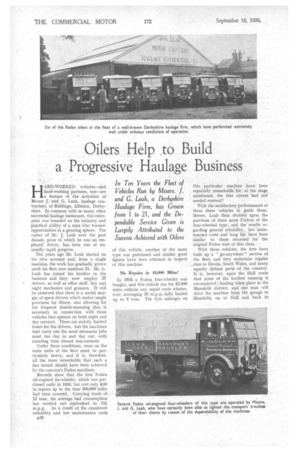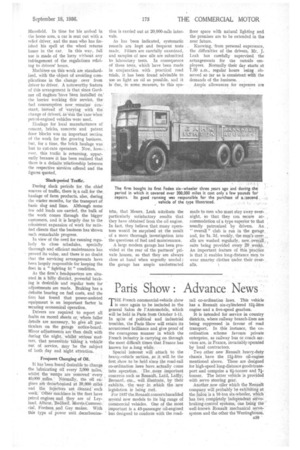Oilers Help ,to Build a Progressive Haulage Business
Page 52

Page 53

If you've noticed an error in this article please click here to report it so we can fix it.
HARD-WORKED vehicles—and hard-Working Partners, too—are a feature of the .activities of Messrs J.and G. Leah, haulage contractors, of Riddings, Alfreton, Derbyshire. In common with so many other successful haulage businesses, this enterprise was founded on the industry and practical ability of a man who foresaw opportunities in a growing sphere. The career of Mr. J. Leah over the past decade, prior to which he was an employed driver, has , been one of unusually rapid progress.
Ten years ago Mr. Leah started on his own account and, from a single machine, the work has gradually grown until his fleet now numbers 21. Mr. G. Leah has joined his brother_ in the business and they now employ 27 drivers, as well as office staff, day and night mechanics and greasers. It will be observed that there is a useful margin of spare drivers which makes ample provision for illness, also allowing for the frequent double-manning that is necessary in connection with those vehicles that operate on both night and day services. There are strictly limited hours for the drivers, but the machines that carry out the most strenuous jobs must run day in and day out, with standing time almost non-existent.
Under these conditions, wear on the main units of the fleet must be particularly heavy, and it is, therefore, all the more remarkable that such a fine record should have been achieved by the concern's Foden machines.
Records show that the first Foden oil-engined six-wheeler, which was purchased early in 1933, has cost only £40 in repairs up to the time 200,000• miles had been covered. Carrying loads of 12 tons, the average fuel consumption has worked out equivalent to 121 m.p.g. As a result of the consistent reliability and low maintenance costs B38 of this vehicle, another of the same type was purchased and similar good figures have been attained in respect of this machine.
No Repairs in 43,000 Miles!
In 1034 a Foden four-wheeler was bought, and this vehicle ran for 43,000 miles without any repair costs whatsoever, averaging 20 m.p.g.t fully loaded up to 8 tons. The tyre mileages on
this particular machine _have been especially remarkable' for, af the stage mentioned, the rear covers had not
• needed renewal!
With the satisfactory performances' of these three vehicles to guide them, Messrs. Leah then decided upon the purchase of three more Fodens of the four-wheeled type, and the results regarding general reliability,.. low maintenance costs and long life have been similar to those recorded for the original Foden unit of this class.
With these vehicles, the firm have built up a " go-anywhere" section of the fleet, and they undertake regular , runs to Devon, South Wales, and many equally distant parts of the country. It is, however, upon the Hull route that some of the hardest running is encountered ; loading takes place in the Mansfield district, and one man will drive the machine from the garage to Mansfield, on to Hull and back to Mansfield. In time for his arrival in the home area, .a car is sent out with a relief driver, and the man wlio has finished his spell at the wheel returns home in the car. In this way, full use is made .of the lorry without any infringement of the regulations relating to drivers' hours.
Machines on this workare standardized, with the object of avoiding complications in the change over from driver to driver. A noteworthy feature of this arrangement is that since Gardner oil engines-have been installed dn' the lorries Woikiiag this service, the fuel consumption now. remain's. constant, instead of 'varying . with the change of drivers; as 'Was the 'case When. petrol-engined vehicles were used.
Haulage for local manufacturers of cement, bricks, concrete and patent floor blocks was an important section of the work for the growing business, but, for a time, the 'brick haulage was lost to cut-rate operators. Now,
however, this traffic is returning, apparently. because it has been realized that there is a definite :relationship between the respective services offered and the figures quoted.
'Slack=period Traffic.
During slack periods for the chief sources of traffic, there is a call for the haulage of farm products, also, during the winter months, for the transport of basic slag -and lime. Although some few odd loads are carried, the bulk of the work comes through the bigger customers, and it is largely due to the consistent expansion of work for satisfied clients that the business has shown such remarkable progress.
In view of the need for running regularly to close schedules, specially thorough and efficient maintenance has proved its value, and there is no doubt that the servicing arrangements have been largely responsible for keeping the fleet in a "fighting fit "condition.
As the firm's headquarters are situated in a hilly district, powerful braking is desirable and regular tests for adjustments are made. Braking has a definite bearing on fuel costs, and the firm has found that power-assisted equipment is an important factor in securing economical operation.
Drivers are req-nired to report all faults on record sheets or, where fuller details are necessary, to give all particulars on the garage notice-board. Minor adjustments are then dealt with during the night, :whilst serious' nia-t ters, that necessitate taking a Vehicle but of service, may be the subject of both day and night attention.
Frequent Changing of 6i1.
1E iras been found desirable to change the lubricating oil every 3,000 Miles; whilst the -suinps are removed every 40,000 ,riales. NOrmally, the oil engines are '&6A:ionized at 30,000 and the injeCtors "are. Cleaned each week: Oilier machines in the fleet have petrol engines and, they are of Leyland, Albion, 'Bedford, Morrii-Conamer-, cial, FOrdson and Guy makes. With this type of power unit decarboniza
tion is carried out at 20,000-mile intervals.
As has been indicated, systematic records are kept and frequent tests made. Filters are carefully examined, and samples of new oils are submitted to . laboratory tests. In consequence of these tests, which have been made in conjunction with practical road trials, it has been found advisable to. use as light an oil as possible, and it is clue, in some .measure, to this sys- tern, that Messrs. Leah attribute the particularly satisfactory results that they have obtained from the oil engine. In fact, they believe that many operators would be surprised at the result of a more thorough investigation into the questions of fuel and maintenance.
A large modern garage has been provided at the rear of the partners' private houses, so that they are always close at hand when urgently needed ; the garage has ample unobstructed
floor space with natural lighting and the premises are to be extended in the near future.
Knowing, from personal experience, the difficulties of the drivers, Mr. J. Leah has carefully supervised the arrangements for the outside employees. Normally their day starts at 7.30 a.m., regular hours being observed so far as is consistent with the demands of the business.
Ample allowances for expenses are
made to men who must stay away overnight, so that they can secure ac, commodation of a type superior to that usually patronized by drivers. An..: " overall " club is run in the garage, and, for Is. 8d. weekly, the men's overails are washed regularly, new, caireP4,110 suits being provided every 20 week,. An important feature of this prae,tiee is that it enables long-distance men to wear smarter clothes under their overalls.




























































































